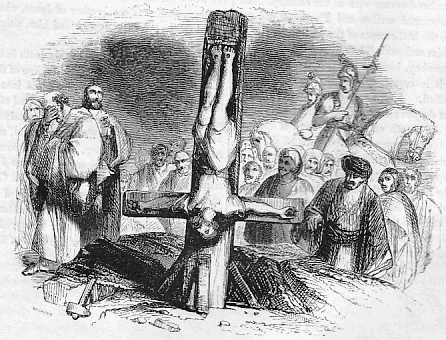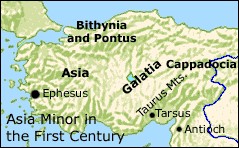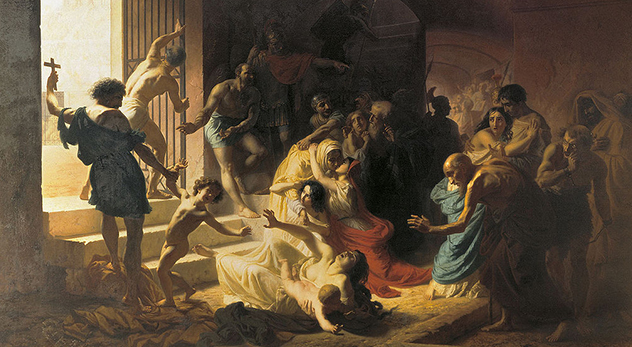Pagan influences are driving much of the persecution of Christian today just as they drove the persecution of Christ and Peter.
In the video below, Andrew White, the Vicar of Bagdad, relates the story of four Christian children beheaded by ISIS for refusing to deny Jesus.
The Apostle Peter wrote his first epistle to churches suffering persecution in Asia Minor. 1 Peter provides a theology of suffering which may prove highly relevant in the West, as it already is in the Middle East.
Peter was a simple fisherman from Galilee whose life was transformed by the messiah – Jesus Christ. Peter was literate, but he lacked the formal education of Paul, the apostle to the Gentiles.
As a friend and disciple of Christ, Peter personally witnessed the persecution and suffering of Jesus (1 Peter 1:1; 5:1). This faithful follower of Christ left the familiar comfort and serenity of his home on Lake Tiberias to spend the last 10 years of his life in a bustling, frenetic metropolis: Rome, the cultural, economic, and political capital of the civilized world.
 Peter undoubtedly witnessed the burning of Rome, and, with the early church, suffered the first persecution under Nero. Tradition says he was crucified upside down in Rome, about 68 AD.
Peter undoubtedly witnessed the burning of Rome, and, with the early church, suffered the first persecution under Nero. Tradition says he was crucified upside down in Rome, about 68 AD.
This old apostle wrote his first letter (1 Peter 1:1) with the help of his scribe, Silvanus (5:12), during Nero’s reign, sometime around 62-63 AD. These years were a time of relatively “soft persecution” of Christians throughout the larger Roman world, shortly before the “smash persecution” after the fire of Rome.
Peter was probably writing from Rome: “She who is in Babylon, chosen together with you, sends you her greetings, and so does my son Mark” (5:13). He uses the term Babylon to refer to Rome. The Apostle John did the same 30 years later (Rev. 17:9-10). Rome represented worldly philosophy and power.
“Babylon” is the Greek equivalent of Babel in Hebrew. The word references the events of Genesis 11 when mankind tried to build a tower to heaven. Babel/Babylon came to symbolize man’s attempt to displace God’s sovereignty with man’s. Man, not God, will rule the earth. Babylon represents “the world’s system,” which is in rebellion against the kingdom of God and whose final defeat is recorded in Revelation 17-18.
The letter was written to the churches in Asia Minor (1:1), the Roman provinces of Pontus, Galatia, Cappadocia, Asia and Bithynia, north of the Taurus Mountains.
 That was the geography of these churches, but they breathed the air of Babylon, the world’s system. They were likely early Christian converts from paganism. Peter says they were saved from “the empty way of life handed down from [their] forefathers” (1:18). Before they were saved by Christ they lived an “empty” (μάταιος – mataios), futile, worthless way of life. All pagan philosophies lead to lives without direction or purpose.
That was the geography of these churches, but they breathed the air of Babylon, the world’s system. They were likely early Christian converts from paganism. Peter says they were saved from “the empty way of life handed down from [their] forefathers” (1:18). Before they were saved by Christ they lived an “empty” (μάταιος – mataios), futile, worthless way of life. All pagan philosophies lead to lives without direction or purpose.
The Apostle Paul expands on this mindset in his letter to the Galatians in the same geographical region. Paul expresses concern for the young Christians. They have been set free by the blood of Jesus Christ from slavery to the “elementary principles of the world.” But now they are considering putting themselves under authority to the world’s system (like the Hebrews of old wanting to return to slavery in Egypt).
In the same way we also, when we were children, were enslaved to the elementary principles of the world … Formerly, when you did not know God, you were enslaved to those that by nature are not gods. But now that you have come to know God, or rather to be known by God, how can you turn back again to the weak and worthless elementary principles of the world, whose slaves you want to be once more? Galatians 4:3; 8-10
The phrase “elementary principles” is the Greek word stoicheion: first principles or elementary truths (foundational building blocks). To put it another way, these are the ABCs of a pagan culture. These young Christians had been pagans, enslaved to the basic principles of Babylonian society. But now they are free.
Because ideas have consequences, the fundamental principles of a pagan culture lead to pagan behavior. Peter describes the pagan behavior from which the followers of Christ have turned away.
For you have spent enough time in the past doing what pagans choose to do–living in debauchery, lust, drunkenness, orgies, carousing and detestable idolatry. They think it strange that you do not plunge with them into the same flood of dissipation, and they heap abuse on you, 1 Peter 4:3-4 NIV.
Sensuality, passions, drunkenness, orgies, drinking parties, lawless idolatry … these are typical behaviors in pagan culture throughout history. We can see these behaviors growing in Western societies today as a “neo-Paganism” (not actually new) grows in the soil of postmodernism. And what was the pagan response to the Christians in Asia Minor? They found it strange that Christ followers did not join in their pagan lifestyle. Thus did the Babylonian world malign the Christians.
Those Christians were out of step with the Roman world and culture and were experiencing the soft persecution of a counter culture within a pervasive pagan society. That soft persecution grew to squeeze persecution. Under Nero, it accelerated to smash persecution of the Christians in Rome and Asia Minor.
The central message of Peter’s epistle, in his own words, appears in 5:12: “I have written briefly to you, exhorting and declaring that this is the true grace of God. Stand firm in it.” The writer calls us to stand firm in God’s grace in the midst of persecution. God enables us to persevere though suffering, living lives of love and faithfulness and service, even in the midst of cruelty and torment.
In the following posts of this series, we will develop a theology of suffering by examining Peter’s counsel to the persecuted church.
- Darrow Miller







4 Comments
Romina Aliaga
March 9, 2017 - 6:46 pmGracias , por el articulo, me es de bendicion , e inspiracion , a demás que es rico en informacion , estaré expectante a las siguientes publicaciones.
admin
March 10, 2017 - 5:14 amYou’re welcome, Romina. I’m so happy you are enjoying the blog posts. You will be interested to know that we are working with some brothers and sisters in Latin America to provide a Spanish-language version, DarrowMilleryAmigos. Please pray with us for this to come together soon.
Blessings,
Gary Brumbelow
Romina Aliaga
March 10, 2017 - 9:42 amOhhh claro que si, estaré orando, pues yo uso el traductor, y aunque no es muy preciso, disfruto mucho cada articulo! Dios los siga usando.
admin
March 10, 2017 - 2:05 pmGracias!